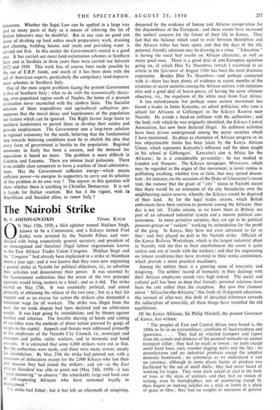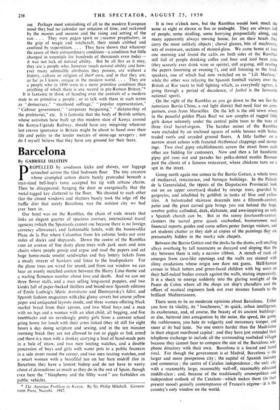The Nairobi Strike
ON May 15th, 1950, a Sikh agitator named Makhan Singh, known to be a Communist, and a Kikuyu named Fred Kubai were arrested by the Nairobi Police, and were charged with being respectively general secretary and president of an unrecognised and therefore illegal labour organisation known as the East African Trades Union Congress. Makhan Singn and his - Congress " had already been implicated in a strike at Mombasa about a year ago ; and it was known that they were now organising a general strike at Nairobi for political objectives, i.e., to advertise their activities and demonstrate their power. It was assumed by the Government authorities that the arrest of the two principal agitators would bring matters to a head ; and so it did. The strike started on May 17th. It was essentially political, and aimed primarily at obtaining the release of the two men ; but as a bait for support and as an excuse for action the strikers also demanded a minimum wage for all workers. The strike was illegal from the start, for no trade dispute had been declared and no arbitration sought. It was kept going by intimidation, and by threats against families and relatives. The forcible shaving of heads and cutting of ear-lobes were the methods of direct action pursued by gangs of toughs in the capital. Appeals and threats were addressed primarily to the employees of the Nairobi City Council, i.e., municipal and transport and public utility workers, and to domestic and hotel servants. It is estimated that some 6,000 strikers were out at first. But the authorities were ready, and there were many arrests, mostly for intimidation.- By May 25th the strike had petered out, with a minimum of dislocation except for the 2,000 Kikuyu who lost their jobs because they- had joined the strikers ; and yet—as the East
African Standard was able to point out (May 24th, 1950)—it was - most reassuring " to observe " the remarkably large and hard core of self-respecting Africans who have remained loyally in employment."
The strike had failed ; but it has left an aftermath of misgiving, deepened by the evidence of Indian and African co-operation for the discomfiture of the European ; and these events have increased the settlers' concern for the future of their life in Kenya. They feel that the balance which used to exist between themselves and the African tribes has been upset, and that the days of the old, paternal, friendly relations may be drawing to a close. " Education " is having the .usual bad results on African character, as well as many good ones. There is a good deal of anti-European agitation going on, of which Dini Ya Msambwa (which I examined in an article in the Spectator of August 11th) has been the most dramatic expression. Besides Dini Ya Msambwa—and perhaps connected with it—there has been plenty of evidence in recent months of the existence of secret societies among the African natives, with initiation rites and a good deal of hocus-pocus, all having the same ultimate objective, viz., the expulsion of the white man from East Africa.
A less melodramatic but perhaps more serious movement has found a leader in Jomo Kenyatta, an adroit politician, who runs a school for Africans at Githunguri in the Kikuyu Reserve near Nairobi. He avoids a head-on collision with the authorities ; and the body with which he was originally identified, the Kikuyu Central Association, has now been declared illegal. Its seditious activities have been driven underground among the secret societies which I have mentioned. Its place as champion of African progress in its less objectionable forms has been taken by the Kenya African Union, which represents Kenyatta's influence and the ideas taught in his school at Githunguri. Kenyatta's aim is Africa for the Africans ; he is a considerable personality ; he has studied in London and Moscow. The Kikuyu newspaper, Merenyere, which may be regarded as the organ of this movement, is never remiss in publishing anything, whether true or false, that may spread discon- tent ; for instance, on the occasion of the Duke of Gloucester's recent visit, the rumour that the grant of " city " status to Nairobi meant that there would be an extension of the city boundaries over the neighbouring native reserve, whereby the Kikuyu would be deprived of -their land. As for the legal trades unions, which British enthusiasts have been anxious to promote among the Africans, their day is not yet. Trades unions, as we know them in Britain, are part of an advanced industrial system and a mature political con- sciousness. In more primitive societies, they are apt to be political pressure groups or " rackets " working by intimidation for the profit of the gang. In Kenya, they have not even advanced so far as that ; and they played no part in the Nairobi strike. Officials of the Kenya Railway Workshops, which is the largest industrial plant in Nairobi, told me that in their establishment the union is quite useless and out of touch with the workers ; and that for negotiating on labour conditions they have reverted to their works committees, which provide a more practical machinery.
Among the settlers there is a growing sense of insecurity and misgiving. The settlers' record of humanity in their dealings with . their African employees stands very high indeed. The social and cultural gulf has been so deep that friendly personal relations have been the rule rather than the exception. But now this clamour about " Africa-for-the-Africans," this froth of ill-digested education, this turmoil of after-war, this drift of detached tribesmen towards the indiscipline of town-life, all these things have unsettled the old equilibrium.
Of the Kenya Africans, Sir Philip Mitchell, the present Governor of Kenya, has written: " The peoples of East and Central Africa were found in the 1890s to be in an extraordinary condition of backwardness and ignorance. . . . They had no wheeled transport and (apart from the camels and donkeys of the pastoral nomads) no animal transport either ; they had no roads or towns ; no tools except small hand hoes, axes, wooden digging sticks and the like ; no manufactures and no industrial products except the simplest domestic handiwork ; no commerce as we understand it and no currency, although in some places barter of produce was facilitated by the use of small shells ; they had never heard of working for wages. They went stark naked or clad in the bark
of .trees or. the skins of animals, and they had no means of writing, even by hieroglyphics, nor of numbering except by
their fingers or making notches on a stick or knots in a piecto of grass or fibre : they had no weights or measures of general
use. Perhaps most astonishing of all to the modern European mind they had no calendar nor notation of time, and reckoned by the moons and seasons and the rising and setting of the sun. . . . They were pagan spirit or ancestor propitiators, in the grip of magic and witchcraft, their minds cribbed and confined by superstition. .. . They have shown that whatever the cause of their extraordinary condition—a condition but little changed in essentials for hundreds of thousands even today— it was not lack of natural ability. But be all this as it may, they area people who, however much natural ability and how- ever many admirable attributes they possess, are without a history, culture or religion of their own, and in that they are, as far as I know, unique in the modern world. . . . They are a people who in 1890 were in a more primitive condition than anything of which there is any record in pre-Roman Britain"• It is fantastic to think of handing over the controls of a modern state to so primitive a people ; or to talk with them in such terms as " democracy," " manhood suffrage," " popular representation," "Cabinet government," " corporate bargaining," " dictatorship of the proletariat," etc. It is fantastic that the body of British settlers, whose activities have built up this modern state of Kenya around the Kenya-Uganda Railway, should have any misgiving whatever lest craven ignorance in Britain might be about to hand over their life and polity to the tender mercies of stone-age savagery ; nor
do I myself believe that they have any ground for their fears.































 Previous page
Previous page